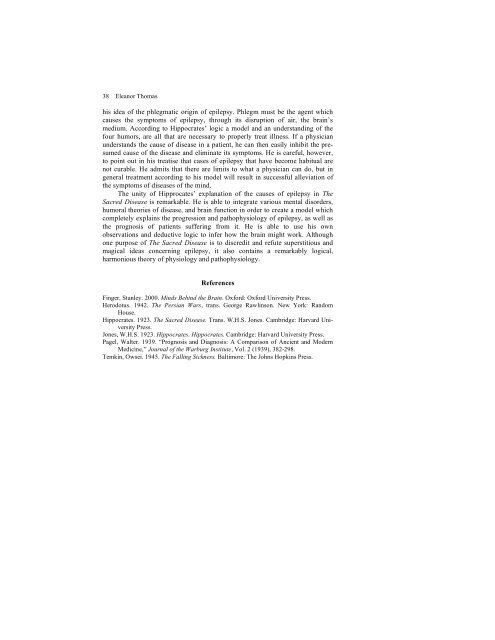You also want an ePaper? Increase the reach of your titles
YUMPU automatically turns print PDFs into web optimized ePapers that Google loves.
38 Eleanor Thomas<br />
his idea of the phlegmatic origin of epilepsy. Phlegm must be the agent which<br />
causes the symptoms of epilepsy, through its disruption of air, the brain’s<br />
medium. According to Hippocrates’ logic a model and an understanding of the<br />
four humors, are all that are necessary to properly treat illness. If a physician<br />
understands the cause of disease in a patient, he can then easily inhibit the presumed<br />
cause of the disease and eliminate its symptoms. He is careful, however,<br />
to point out in his treatise that cases of epilepsy that have become habitual are<br />
not curable. He admits that there are limits to what a physician can do, but in<br />
general treatment according to his model will result in successful alleviation of<br />
the symptoms of diseases of the mind.<br />
The unity of Hipprocates’ explanation of the causes of epilepsy in The<br />
Sacred Disease is remarkable. He is able to integrate various mental disorders,<br />
humoral theories of disease, and brain function in order to create a model which<br />
completely explains the progression and pathophysiology of epilepsy, as well as<br />
the prognosis of patients suffering from it. He is able to use his own<br />
observations and deductive logic to infer how the brain might work. Although<br />
one purpose of The Sacred Disease is to discredit and refute superstitious and<br />
magical ideas concerning epilepsy, it also contains a remarkably logical,<br />
harmonious theory of physiology and pathophysiology.<br />
References<br />
Finger, Stanley. 2000. Minds Behind the Brain. Oxford: Oxford <strong>University</strong> Press.<br />
Herodotus. <strong>19</strong>42. The Persian Wars, trans. George Rawlinson. New York: Random<br />
House.<br />
Hippocrates. <strong>19</strong>23. The Sacred Disease. Trans. W.H.S. Jones. Cambridge: Harvard <strong>University</strong><br />
Press.<br />
Jones, W.H.S. <strong>19</strong>23. Hippocrates. Hippocrates. Cambridge: Harvard <strong>University</strong> Press.<br />
Pagel, Walter. <strong>19</strong>39. “Prognosis and Diagnosis: A Comparison of Ancient and Modern<br />
Medicine,” Journal of the Warburg Institute, Vol. 2 (<strong>19</strong>39), 382-298.<br />
Temkin, Owsei. <strong>19</strong>45. The Falling Sickness. Baltimore: The Johns Hopkins Press.

















